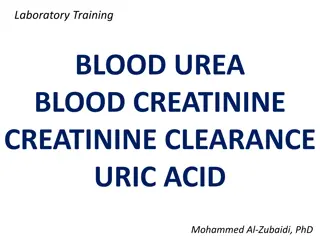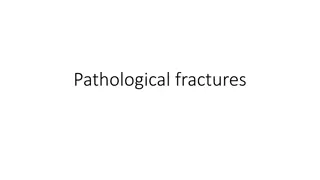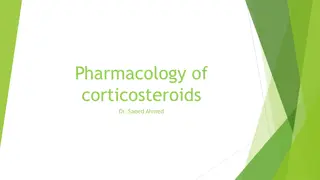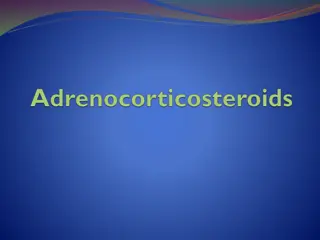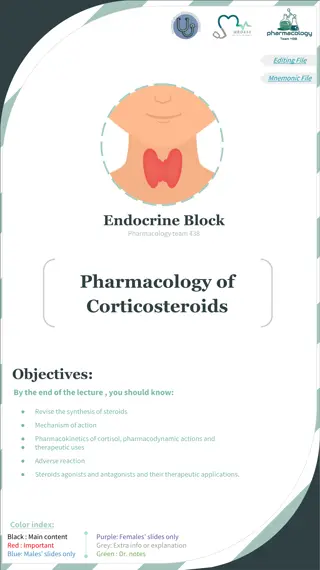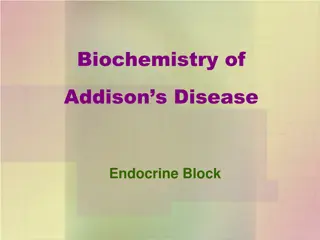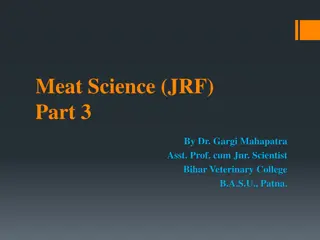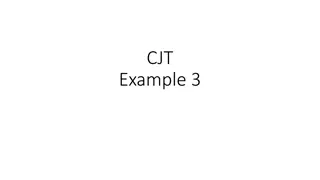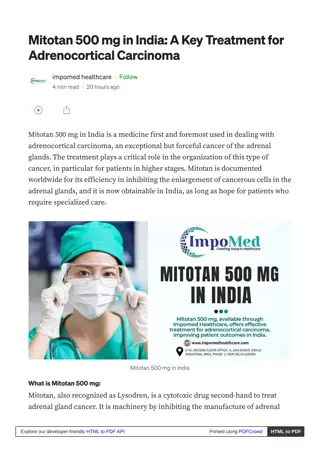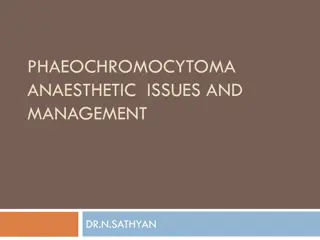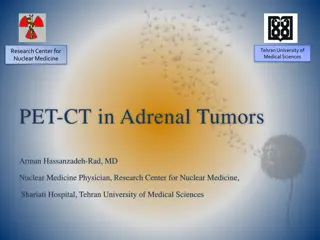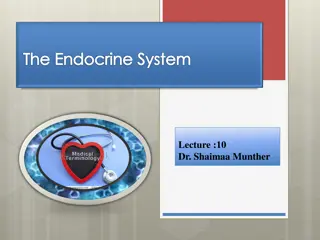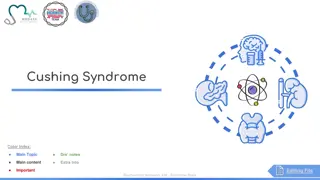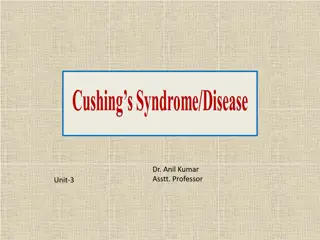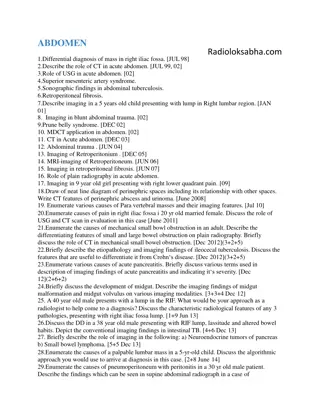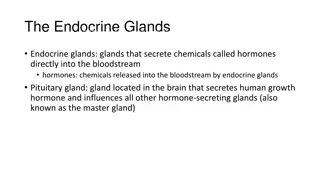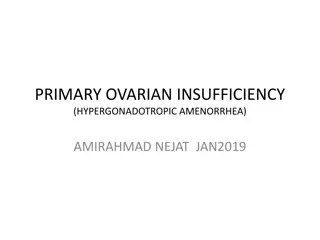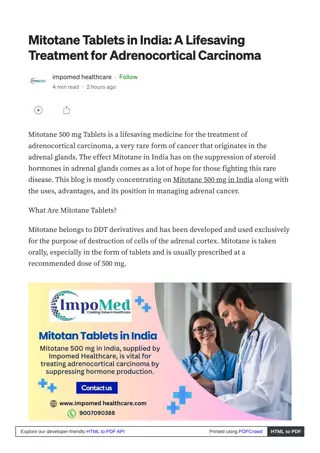Antibiotic Adaptation in Renal Insufficiency - Dosage Adjustments and Risks
Understanding the importance of adapting antibiotic therapy in patients with renal insufficiency is crucial to ensure efficacy and minimize risks. This content covers various factors influencing antibiotic selection, dosing adjustments based on patient parameters, and the risks associated with inapp
0 views • 52 slides
Main Failures Faced by the Reserve Bank of India
The Reserve Bank of India has encountered several challenges including lack of adjustment in the money market, absence of uniformity in interest rates, inadequate bill market development, insufficiency of agricultural credit availability, lack of banking facilities in rural areas, and instability in
2 views • 11 slides
Adrenal Gland
This content delves into the detailed structure and function of the adrenal gland, focusing on the differentiation between the cortex and medulla, the histological features of each zone, and the hormones produced. From the distinction of various cortical layers to the role of chromaffin cells in the
0 views • 8 slides
Know All About Primary Ovarian Insufficiency (POI)
Understanding the causes, identifying the symptoms, and analyzing available therapies are important for managing this difficult reproductive health issue effectively. Reasons for Premature Ovarian Failure include various elements, including genetic abnormalities, autoimmune disorders, chemotherapy,
0 views • 7 slides
Mitotane 500 mg – The Future of Adrenal Cortex Cancer Treatment in India
Mitotane 500 mg represents a promising advancement in the treatment of adrenal cortex cancer in India. Known for its targeted approach, Mitotane effectively disrupts adrenal cancer cell function and growth. Its use offers hope for improved survival rates and better quality of life for patients. As a
0 views • 3 slides
Understanding Kidney Function and Laboratory Tests
This article delves into the structure and function of the kidneys, specifically focusing on nephrons and the implications of nephron loss. It also discusses the importance of blood urea and serum creatinine tests in evaluating kidney function, highlighting the differences between the two and their
2 views • 44 slides
Managing Nutritional and Metabolic Diseases in Zoo and Wild Animals
The prevention, control, and treatment of nutritional and metabolic diseases in zoo and wild animals are essential for maintaining their health. These diseases, such as rickets, osteoporosis, osteomalacia, and fibrous osteodystrophy, can result from imbalances in dietary nutrients and metabolic dera
0 views • 10 slides
Understanding Fractures: Traumatic vs. Pathological and Modeling Options
Defining the distinction between traumatic and pathological fractures, exploring the relationship between non-traumatic fractures and underlying bone pathologies, and discussing modeling options for classifying fractures. Stress fractures, insufficiency fractures, and the causes of pathological frac
3 views • 8 slides
Understanding Pharmacology of Corticosteroids by Dr. Saeed Ahmed
Corticosteroids are steroid hormones produced by the adrenal cortex, classified into glucocorticoids and mineralocorticoids. Glucocorticoids have diverse effects on metabolism, immune responses, and inflammation, whereas mineralocorticoids regulate electrolyte balance. Mechanistically, corticosteroi
1 views • 32 slides
Understanding Induction of Parturition in Animals
Explore the process of inducing and terminating parturition in animals, including the hormonal changes associated with pregnancy, fetal nutritional demands, and indications for induction. Learn about the role of oxytocin, adrenal changes in fetuses, and various methods used for inducing parturition.
0 views • 28 slides
Understanding Adrenal Androgens and Their Role in the Endocrine System
Explore the significance of adrenal androgens in the endocrine system, including their production, function, and impact on male and female physiology. Learn about conditions like adrenogenital syndrome and the crucial role of adrenal cortex in hormone synthesis.
0 views • 14 slides
Overview of Shock Classifications and Causes
Shock is classified into different types such as Hypovolemic, Cardiogenic, Obstructive, Distributive, and Endocrine shock. Hypovolemic shock results from fluid loss, while Cardiogenic shock is due to heart failure. Obstructive shock occurs from mechanical obstructions, whereas Distributive shock is
1 views • 11 slides
Understanding the Role of Corticosteroids in Adrenal Function
The adrenal gland consists of the cortex and the medulla, each responsible for secreting different hormones. The cortex produces glucocorticoids, mineralocorticoids, and adrenal androgens, while the medulla secretes catecholamines. Corticosteroids play a crucial role in regulating metabolism, stress
0 views • 18 slides
Pharmacology of Corticosteroids: Synthesis, Mechanism of Action, and Therapeutic Uses
Corticosteroids are steroid hormones produced by the adrenal cortex, divided into glucocorticoids and mineralocorticoids. They play crucial roles in metabolism, immunity, inflammation, and electrolyte balance. Glucocorticoids like cortisol stimulate gluconeogenesis, influence glucose levels, and hav
0 views • 9 slides
Understanding the Biochemistry of Addison's Disease in the Endocrine System
Addison's Disease, a primary adrenocortical hypofunction, involves the adrenal gland's cortex and its hormone synthesis. The condition affects aldosterone and cortisol production, impacting electrolyte balance and blood pressure regulation. Learn about the anatomical and histological aspects of the
0 views • 21 slides
Utilization of Glands and Biochemicals in Meat Science Research
Glands play a crucial role in meat science research, with various organs such as pancreas, adrenal glands, and parathyroid gland providing valuable biochemicals like insulin, thyroxine, and corticosteroids. The extraction methods and applications of these glands in food science and medicine are deta
0 views • 25 slides
Clinical Judgement Test: Neonatal Foal Case Presentation and Assessment
This case involves a clinical judgement test scenario of an 8-hour-old Standardbred colt foal presenting with recumbency, weakness, and abnormal blood parameters. The foal's history suggests possible placental insufficiency and dysmaturity, leading to pulmonary dysfunction and other complications. I
0 views • 14 slides
Mitotan 500 mg: Essential Adrenocortical Carcinoma Therapy Now in India
Mitotan 500 mg is a key medication for treating adrenocortical carcinoma, now available in India. This drug targets adrenal tumors, decreases hormone levels and inhibits cancer growth. Impomed Healthcare ensures the broad availability of Mitotan 500
1 views • 10 slides
Enhancing Quality of Life for Individuals with No Adrenals: Insights from GoodHormoneHealth Webinar
Discover key insights on managing life without adrenals, including discussions on adrenal hormones, optimal replacement strategies, necessary tests, stress dosing, and more. Explore the roles of the adrenal glands, hormones such as cortisol and aldosterone, and the Renin-Angiotensin-Aldosterone Axis
0 views • 55 slides
Understanding and Utilizing the DUTCH Test for PCOS
Polycystic Ovary Syndrome (PCOS) is a common endocrine disorder in females with various genetic, environmental, and lifestyle influences. The Rotterdam Criteria, involving oligo/amenorrhea, hyperandrogenism, and polycystic ovaries, is used for PCOS diagnosis. The DUTCH Complete test can assess insul
0 views • 92 slides
Fault-tolerant and Load-balanced VuFind Project Overview
Project Background: Part of the National Digital Library initiative, the VuFind project aims to provide a discovery interface for Finnish archives, libraries, and museums. It started development in 2012 due to the insufficiency of existing commercial products. The focus is on enhancing fault toleran
1 views • 19 slides
Respiratory Care in FSHD: Guidelines and Management Overview
Comprehensive overview of respiratory care in Facioscapulohumeral Muscular Dystrophy (FSHD) based on the American Academy of Neurology guidelines. Covers incidence of respiratory insufficiency, assessment of lung function, treatment options including noninvasive ventilation, and strategies for maint
0 views • 16 slides
Anesthetic Management of Phaeochromocytoma: Key Issues and Strategies
Phaeochromocytoma, a neuroendocrine tumor of the adrenal medulla, presents unique challenges in anesthesia due to excessive catecholamine secretion. From clinical presentation to familial associations, this condition requires careful diagnosis and management to avoid complications during surgery. Un
0 views • 39 slides
Understanding PET-CT Imaging in Adrenal Tumors at Tehran University
Tehran University of Medical Sciences' Research Center for Nuclear Medicine specializes in PET-CT imaging for adrenal tumors. Dr. Arman Hassanzadeh-Rad, MD, explains the principles of PET imaging, hybrid imaging combining PET and CT, F-18 FDG use, SUV measurement, and more. PET-CT allows for both at
0 views • 21 slides
Endocrine Potpourri: Adrenal Insufficiency and Incidentalomas - Case-Based Review
This endocrine potpourri covers various cases involving adrenal insufficiency, adrenal crisis, adrenal incidentalomas, and patient education. It includes a detailed case presentation, treatment guidelines for adrenal crisis, patient education on adrenal insufficiency, and evaluation of adrenal nodul
0 views • 62 slides
Understanding Sleep and Epilepsy: Tips for a Restful Night
Delve into the intricate relationship between epilepsy and sleep, exploring the functions of sleep, optimal sleep durations, common sleep disorders, and best practices for quality sleep. Uncover valuable insights such as why we sleep, sleep requirements for adults, epidemiological data on sleep insu
0 views • 33 slides
Understanding the Endocrine System: Key Concepts and Functions
The endocrine system, consisting of glands that release hormones into the bloodstream, plays a crucial role in regulating various body processes like metabolism, growth, reproduction, and stress response. Key glands include the pituitary, thyroid, pancreas, adrenal, ovaries, and testes, each produci
0 views • 34 slides
Understanding Cortisol and Cushing's Syndrome: Biochemical Insights
This content delves into the physiological and biochemical aspects of cortisol, diagnostic algorithms for Cushing's syndrome, and the interpretation of laboratory and radiological investigations for diagnosis. Explore the adrenal gland's anatomical features, the HPA axis, and glucocorticoid function
0 views • 16 slides
Understanding Cushing Disease in Dogs and Cats
The pituitary gland, or "Master Gland," plays a crucial role in hormone regulation in the body. Cushing disease, a common endocrine disorder in middle-aged to older dogs and cats, is often caused by tumors in the pituitary or adrenal glands. Symptoms include increased thirst, appetite, panting, obes
0 views • 22 slides
Comprehensive Radiological Imaging Review in Abdominal and Adrenal Pathologies
This extensive radiological imaging review covers a wide range of topics in abdominal and adrenal pathologies, discussing differential diagnoses, imaging modalities such as CT and USG, specific syndromes like prune belly syndrome, and conditions like retroperitoneal fibrosis. It delves into various
0 views • 39 slides
Understanding Quantity with Adverbs: Too, Enough in English Grammar
Learn about using adverbs to express quantity in English grammar with examples of using "too" and "enough" in different contexts. Discover how these adverbs modify verbs, adjectives, and nouns to convey varying degrees of abundance or insufficiency.
0 views • 12 slides
Understanding How Hormones Interact: The Endocrine System
The endocrine system comprises glands that release hormones into the bloodstream, influencing various bodily functions. Key glands include the pituitary, pineal, thyroid, pancreas, gonads, and adrenal glands, each playing a crucial role in regulating metabolism, growth, stress response, and reproduc
0 views • 5 slides
Understanding the Endocrine System: Glands and Hormones in Detail
Explore the intricate details of the endocrine system, focusing on key glands like the thyroid, parathyroid, adrenal, pancreas, and thymus, their functions, hormone secretion, and role in maintaining physiological balance through hormonal regulation mechanisms.
0 views • 13 slides
Understanding Primary Ovarian Insufficiency: Definition, Pathophysiology, Clinical Features
Primary ovarian insufficiency, also known as hypergonadotropic amenorrhea, is a condition characterized by ovarian dysfunction in women under 40. It involves oligo/amenorrhea, elevated FSH levels, and impacts fertility and overall health. The pathophysiology includes follicle depletion and dysfuncti
0 views • 46 slides
Mitotane 500 mg Tablets: Essential Treatment for Adrenocortical Carcinoma
Mitotane 500 mg Tablets are a vital treatment for individuals suffering from adrenocortical carcinoma, a rare cancer affecting the adrenal glands. These tablets work by suppressing hormone production, significantly alleviating symptoms and improving
2 views • 11 slides
Understanding Hemangiopericytoma: Symptoms, Diagnosis, and Treatment
Hemangiopericytoma is a rare soft tissue tumor originating from pericytes in capillaries. Learn about its symptoms, diagnosis methods, treatment options, and the role of pathology and IHC. Follow-up care, adrenal tumor functionality, and potential associations with MEN syndrome are also discussed.
0 views • 36 slides





